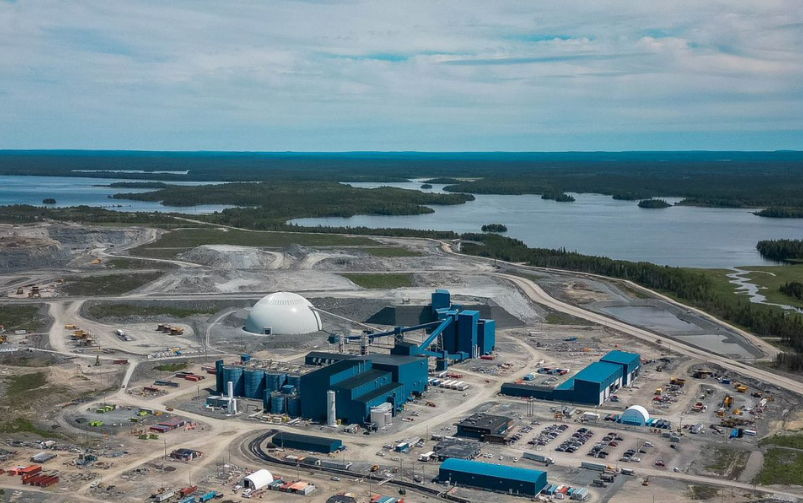Ottawa intervened after the Canadian National Railway and the Canadian Pacific Kansas City railway shutdown on Aug. 22 following an ongoing labour dispute, marking the first time in history that both railways had a work stoppage simultaneously. Courtesy of Canadian National Railway.
Welcome back to your weekly mining news recap, where we catch you up on some of the news you may have missed. This week’s headlines include a tuition-free diamond drilling program for members of Ontario’s Taykwa Tagamou Nation, an ongoing strike at Lundin’s Caserones mine and Victoria Gold’s CEO being let go following the Eagle gold mine heap leach failure.
The Canadian government forced binding arbitration in a labour dispute after two of Canada’s major railways ground to a halt on Thursday following a lockout of 9,300 employees by the Canadian National Railway (CN) and Canadian Pacific Kansas City (CPKC), as reported by The Canadian Press. A contract dispute has dragged on for months between the railways and the Teamsters union that represents workers from both rail companies. While the Canadian National Railway Co. has ended its lockout and workers are returning, CN said it is awaiting approval from the Canada Industrial Relations Board.
Electra Battery Metals has received US$20 million from the U.S. Department of Defense to help with the development of a cobalt sulfate refinery, which will produce battery-grade materials used in lithium-ion batteries. Electra is expanding an existing plant located between the town of Cobalt and Temiskaming Shores, with construction underway. Once complete, it is expected to generate 6,500 tonnes of cobalt annually. The company said that this would enable the production of over one-million electric vehicles per year.
Manitoba reached a milestone on Aug. 16 as the first shipment of critical minerals in over two decades set sail from the Port of Churchill. The shipment of zinc concentrate was mined from Hudbay Minerals’ Snow Lake operations in the province and marks a significant achievement for the Arctic Gateway Group (AGG), which is owned by a partnership of 41 First Nation and Bayline communities and operates both the port and the Hudson Bay Railway.
Timmins-based company NPLH Drilling and Northern College are working together to provide members of the Taykwa Tagamou Nation (TTN) with free access to a diamond drilling training program, as reported by Northern Ontario Business. The program, which costs roughly $4,500 per student, offers hands-on training to teach students how to operate drilling equipment safely. The program’s first group will include 10 students from TTN and will begin in the fall.
The ongoing strike at Lundin Mining’s Caserones copper mine in Chile is showing no signs of stopping, the president of the union shared on Aug.19, as reported by Reuters. The union, which represents around 30 per cent of the mine’s total workforce, started the strike on Aug. 12 after contract negotiations broke down. According to a ruling shared on Aug. 21, a Chilean court has directed the union to cease blocking roads that provide access to the mine after Lundin filed a complaint. Last year the mine produced 139,520 tonnes of copper.
PricewaterhouseCoopers (PwC), the agency overseeing the assets of Victoria Gold, has fired the company’s CEO John McConnell, as reported by CBC News. The Ontario Superior Court of Justice placed Victoria Gold into receivership last week and appointed PwC to manage the company’s assets following a heap leach pad failure that occurred on June 24 at its Eagle mine site in Yukon.
Australia’s Green Technology Metals has teamed up with South Korean battery company EcoPro Innovation, which will invest around $7.3 million for a 16.6 per cent stake in the company to propel Green Tech’s lithium projects in Ontario, as reported by Northern Ontario Business. The funding will facilitate a feasibility study for the Seymour lithium project near Armstrong to investigate if it is economically viable to build a mine at the site and to construct a refinery in Thunder Bay.
Norway House Cree First Nation will purchase Flying Nickel Mining’s Minago nickel project in Manitoba for $8 million, as reported by Canadian Mining Journal. The Minago project is situated in the Thompson belt, Canada’s second-largest nickel belt, and holds substantial nickel resources, with five billion pounds of nickel being extracted from this belt throughout its mining history.
While battery electric vehicles (BEVs) are revolutionizing the mining industry, to fully implement them, mine operators must make substantial infrastructure investments and adjust their mine plans, keeping in mind everything from dispatching considerations to vehicle range, Graham Chandler wrote for the June/July issue of CIM Magazine. Simulation models can help assess the effects of BEVs and allow operators to plan for electrification, while there must also be a culture change to advance the technology.
Bernard Aubé, the owner of Envirobay Inc and a seasoned water management and treatment consultant, stressed the need for early planning in addressing acid rock drainage in an interview with Ailbhe Goodbody for the August issue of CIM Magazine, pointing out that insufficient initial investment can result in increased costs and project delays. Aubé is technical chair of the upcoming 13th International Conference on Acid Rock Drainage (ICARD 2024), which will take place from Sept. 16 to 20 in Halifax, Nova Scotia.
That’s all for this week. If you’ve got feedback, you can always reach us at editor@cim.org. If you’ve got something to add, why not join the conversation on our Facebook, Twitter, LinkedIn or Instagram pages?




